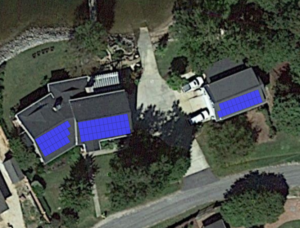Monday, August 22, 2022 Today’s eEdition 77°F 81° 68° Local News Business Triangle Now Sports Living Jobs/Recruiting Personal Finance Obituaries BUSINESS Duke wants to use some F-150 Lightning batteries. And it’ll pay part of the lease. BY ADAM WAGNER AUGUST 20, 2022 10:19 AM Duke Energy and Ford Motors are working together on a pilot program that would see Duke pay a small part of customers’ lease payment each month in return for being able to draw power from batteries of the F-150 Lightning, shown here. The N.C. Utilities Commission needs to approve the program, which is only available to Duke Energy Carolinas customers. Ford Motor Company When energy demand in North Carolina spikes, Duke could turn to your electric-powered pickup truck to keep it from turning to more traditional power sources. Duke is asking the N.C. Utilities Commission to approve a pilot program in which it would pay a small part of the monthly lease for Ford F-150 Lightning drivers in return for being able to draw power from the vehicles’ batteries at times of very high energy demand. Importantly for Duke, the F-150 Lightning has a battery that can supply energy back to the grid in addition to pulling energy from it.

Company executives hope that this means the trucks can effectively act as miniature moving power plants that can eventually help Duke avoid turning its coal-fired plants on at times when it needs to provide the most energy, like winter mornings or late afternoons in the summer. TOP VIDEOS × The pilot program is important because it will help Duke understand how and when customers are willing to have their electric vehicle batteries used for the grid; how Duke’s using the power will affect the batteries; and how much the utility can depend on the batteries for energy when demand is high. “This is part of our strategy on how we’re going to manage the grid and use customer resources to help our grid out,” said Harry Sideris, Duke Energy’s executive vice president of customer experience, solutions and service. Innovation & Technology newsletter Top stories and insider news from the Triangle’s bustling tech sector. SIGN UP This site is protected by reCAPTCHA and the Google Privacy Policy and Terms of Service apply. The F-150 Lightning is the much-anticipated electric-powered version of the Ford F-150 pickup truck. Demand for the electric vehicle quickly outpaced Ford’s capacity to actually build the trucks, with Ford Authority reporting that some 2022 orders were pushed into the 2023 model year. In a written statement, Stephen Croley, Ford Motor Company’s chief policy officer and general counsel, said, “Ford’s electric vehicles are unlocking new possibilities in energy management for our customers, becoming valuable energy storage sources that are changing the game on the benefits an EV can deliver.” Duke expects to spend about $500,000 on the pilot, which will be available to up to 100 customers in the Duke Energy Carolinas service area. That area encompasses Charlotte, Greensboro and parts of Durham. Get unlimited digital access Subscribe now for just $2 for 2 months. CLAIM OFFER The utility company hopes to launch the pilot in early 2023 and initially expects the F-150 Lightning to be the only eligible vehicle. Customers participating in the program will need to own their homes and install the Ford Charge Station Pro charger, as well as Ford’s Intelligent Backup Power Home Integration System. Duke will draw from the F-150 Lightning batteries as many as three times in each of the months from December to February and again from June to August. The company will be able to pull power from the pick-up trucks one time in each of the other six months of the year. The day before Duke plans to use the batteries, Sideris said, it will contact customers. Duke has not yet decided how much of a battery’s charge it will take during a peak period. “The idea is to make it as least impactful as we can on the customers, and usually on these types of programs we need them for an hour or two,” Sideris said. Customers who participate in the pilot will be able to opt out of having Duke draw upon their batteries as many as two times per summer or winter before their participation in the program could be jeopardized. “We can’t have it completely unreliable in terms of being able to call on it,” Sideris said. “The pilot is only with 100 folks, so it’s small, but as this scales, not everybody is going to be where they need to be every time nor be able to discharge every time.” Using the information gleaned from the pilot, Duke hopes to launch a full-scale program offering incentives for customers whose electric vehicles have so-called bidirectional batteries. That could be possible after two years of the pilot program, Duke said in its filing. Duke included customer-oriented and energy efficiency programs like the one it is proposing with Ford in its carbon dioxide reduction plan filed earlier this year. In each of the four energy generation portfolios, Duke is proposing a mixture of 4.2 gigawatts of consumer-generated power or energy saved annually by 2035. That’s the equivalent of more than three Sharon Harris Nuclear Plants. Sideris said, “These type of programs really are what we’re talking about there: Being able to utilize a large battery a couple of times a month to be able to balance load, shift load around to not have to use other resources that may not be as clean or may not be available at that time.” This story was produced with financial support from 1Earth Fund, in partnership with Journalism Funding Partners, as part of an independent journalism fellowship program. The N&O maintains full editorial control of the work. LOCAL IMPACT Philanthropy plays an increasingly important role in local news — including at The N&O. Stay on top of community-supported journalism at The N&O with our monthly newsletter. Sign up here. RELATED STORIES FROM RALEIGH NEWS & OBSERVER POLITICS & GOVERNMENT At hearings on Duke Energy carbon plan, state hears calls for ‘swift decarbonization’ JULY 15, 2022 1:53 PM ADAM WAGNER 919-829-4669 Adam Wagner covers climate change and other environmental issues in North Carolina. His work is produced with financial support from 1Earth Fund, in partnership with Journalism Funding Partners, as part of an independent journalism fellowship program. Wagner’s previous work at The News & Observer included coverage of the COVID-19 vaccine rollout and North Carolina’s recovery from recent hurricanes. He previously worked at the Wilmington StarNews.
Read more at: https://www.newsobserver.com/news/business/article264652244.html#storylink=cpy

